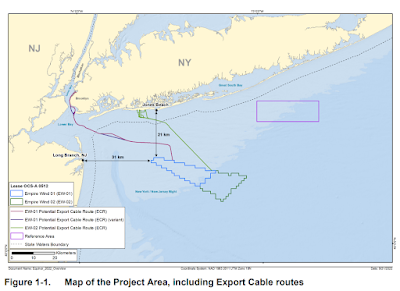Conservation expert: Speculation on whale deaths jumps the shark. | Opinion
Researchers and authorities perform a necropsy examination on a female humpback whale in Brigantine on Jan. 15, 2023. The whale is the 7th to wash shore in New Jersey or New York since early December. (Photo by Michael McKenna of the Marine Mammal Stranding Center)
Conservation expert:
Speculation on whale deaths jumps
the shark.
| Opinion
By
By Capt. Paul Eidman
As
a professional captain and owner-operator of a recreational fishing charter
business in New Jersey, my clients and I are often lucky to come across whales,
dolphins, turtles, and other marine life.
On
several occasions out at sea, I have even been lucky enough to be sitting still
fishing, with the engine off. I have had these enormous humpbacks curiously
swim right up to my boat, raise a pectoral flipper up next to my gunwale and look me in the eye. These experiences are as memorable as fishing, if not
more so, and will remain with me forever as I have felt their energy to the
core of my soul. Because of these experiences, I have been distraught and heartbroken by the
news of recent whale strandings.
However,
some groups have baselessly claimed that these strandings are caused by
offshore wind power development — without waiting for the science on what
really happened.
“Offshore wind offers a clean, economical, beneficial opportunity to combat the climate crisis and an alternative to continuing burning fossil fuels,” "Those who are who are using the tragic deaths of these whales to speak out against any offshore power are engaging in non-scientific speculation,” Eidman said at the press conference.
Whale
strandings can have numerous causes. Whenever an incident like this occurs,
teams of scientists and researchers will respond to the event and collect
evidence from the deceased whale. Then, over the course of months, they will
rigorously assess what could have contributed to the death of these animals.
Speculation on a definitive cause immediately after the death of a whale is
jumping ahead of science by months and, often, inaccurately.
Some
of the groups that have immediately assigned the blame to offshore wind have a
pre-formed conclusion. They have historically opposed offshore wind power and
have never advocated for the well-being of marine mammals. Assigning blame to
the offshore wind industry for these strandings is highly irresponsible. The
fact a
press conference was held by groups known to have opposed offshore wind power, and have had little to
say about marine mammals, demonstrates that this is ideologically driven
opportunism.
Other
groups, which do have a history of caring about and protecting our ocean resources,
may be irresponsibly preempting science. The truth is that soon after a
whale stranding, there is no way to know the immediate cause of the death. After Jan. 1, there were two
offshore wind-related vessels operating far to the south determining seabed
soil composition and bottom mapping— activities that are highly unlikely to cause any harm or
mortality.
Early
indications from
the Marine Mammal Stranding Center in Brigantine are at least one of the
deceased humpbacks was likely due to a vessel strike. However, all parties
should wait until conclusive results are shared.
The
truth is, the reality of whale and human interaction is complicated. We know
climate change and warming waters are worsening the whales’ ecosystems. These
changes in forage prey abundance and location in our region, unfortunately,
intersect with shipping lanes leading into one of the busiest ports in the
world, with vessel traffic increasing weekly. New
York area ports recently surpassed the ports of Los Angeles and Long Beach in shipping activity.
Given these complex ecological dynamics, blaming offshore wind immediately is
far-reaching speculation at best.
This
is not to say that offshore wind power will have no impact on wildlife,
including whales and marine mammals. Offshore
wind power must be developed responsibly, which means avoiding,
minimizing, and mitigating damage or interaction with wildlife wherever
possible. These efforts must be guided by reasonable, peer-reviewed science, in
coordination with scientists, communities, and wildlife experts, not baseless
speculation.
It
is also true that the greatest danger to marine mammals and all wildlife,
including humans, is the climate crisis. We must carefully weigh the impacts to
species against the impacts to wildlife and human communities of the rapidly
unfolding climate crisis.
Warming
waters are, in part, responsible for increasing human-whale conflicts, and are
a threat to numerous other species across the globe, to say nothing about the
threats of sea-level rise, flooding, and storm activity to communities along the
Jersey Shore. Offshore wind offers a clean, economically beneficial opportunity
to combat the climate crisis and an alternative to continuing to burn fossil
fuels.
Those
who are using the tragic deaths of these whales to speak out against any
offshore wind power completely are engaging in nonscientific speculation, and
some are using this as an opportunity to further anti-environmental agendas. On
the climate crisis and on whale strandings, one thing is clear – we must follow
the science.
Paul
Eidman operates Reel Therapy Fly & Light Tackle
Fishing Charters. He is also associated with the nonprofit
group Menhaden Defenders, dedicated to maintaining
stocks of this fish, a major diet component of whales, sharks, seals, and
dolphins. He writes from Tinton Falls.
For more ways to contact Paul click here: Capt. Paul Eidman, NJ USA | Linktree
Our
journalism needs your support. Please subscribe today to NJ.com.
Send a letter to the editor of South
Jersey Times at sjletters@njadvancemedia.com
Bookmark NJ.com/Opinion. Follow on Twitter @NJ_Opinion and find NJ.com Opinion on Facebook.





Another awesome article. Very detailed and informative. Thanks for sharing!
ReplyDeletePrivate Boat Charters New York